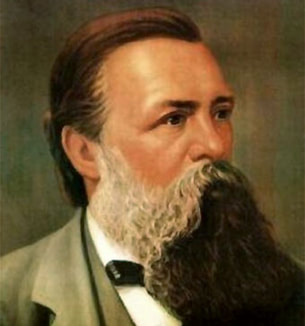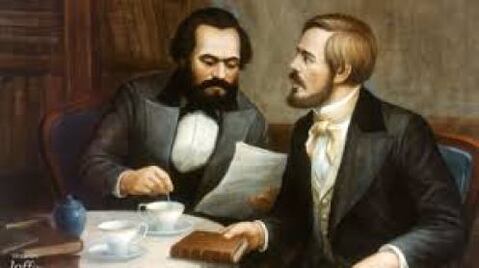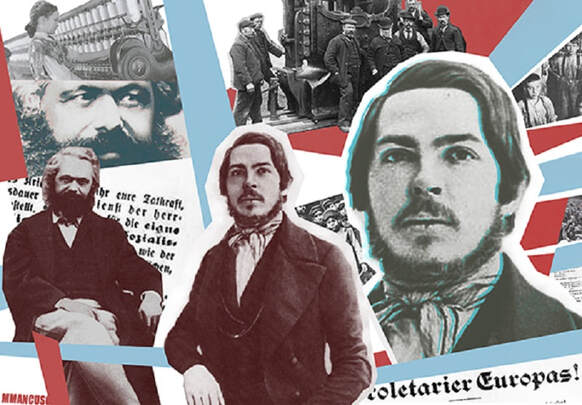|
12/26/2021 Fredrick Engels, 201 YEARS AFTER HIS BIRTH. By: Carlos Alarcón Aliaga Translated By: Andrea DavesRead NowTwo hundred and one years ago, on a day much like today, the 28th of November of 1821, Fredrick Engels (Friedrich Engels in his native language) was born in Germany, the endearing partner of Karl Marx and co-founder of revolutionary Marxism. He was born into a bourgeois family, but because of his human quality, from a very young age he took a stand for the interests and destiny of the proletariat world; and at an early age he took part in the Chartist movement of England and the League of the Righteous, an organization of German workers exiled from England, from said involvement arose his criticism of capitalism in his “Outline of a Critique of Political Economy” and his excellent early piece “The Condition of the Working Class in England”, dedicated to the Working Class of Great Britain. Later, surpassing his early Hegelian philosophy, he commenced his studies on French socialism and political English economy looking to resolve the issue of the economy’s role in political and cultural events. In 1945 he formed an exemplary friendship with Karl Marx; together they resolved the enigmas of philosophy and history that overwhelmed men. They demonstrated that man is as objective as nature, because man is also nature and they broke away from the idealist vision of the world in their co-authored book “ The Holy Family or Critique of Critical Critique” and together they set the pilers to the materialist conception of history in their oeuvre “The German Ideology”. Additionally, together they demonstrated to the world the validity of their materialist conception of history in their analysis content in the “The Communist Manifesto” later, Marx would present rigorously scientific evidence with his monumental work, “Capital”, unraveling the laws of the development of the capitalist mode of production. If it wasn’t for the unconditional and selfless support of Fredrick Engels, Karl Marx would not have been able to create his book “Capital”. During this time, Marx had been deported from Germany and France and was residing in London, where the bourgeois denied him of any job which could be compatible with his investigation regarding the capitalist mode of production, due to this the few offers he obtained to work as a journalistic editor were not enough to maintain his family, because of this Engels had to help them until the publication of the first version of “Capital” in the year 1867. Nevertheless, his contribution to this work, was not only his altruistic work as a friend, but also in his theoretical and argumentative contribution, his comments, advice and recommendations and even, by giving him information which could not be found in the British Museum’s library. Thus, Marx asked Engels to write a piece to include it in his book so that it would be published with co-authorship, but because of his nobility and humility, Engels did not accept the offer. Because of his contribution and rapport with “Capital”, Marx, before dying in 1883, asked Engels to be in charge of the preparation and printing of the following volumes, following the specified publication plan. The job was fulfilled until the third book, cancer betrayed Engels in 1895, transferring the task to Karl Kautsky, who would publish the fourth book on the history of capital gains. No doubt Fredrick Engels, who was self-taught, said that much more was expected from him “because he was a ‘traveling business philosopher’ who had not acquired the right to philosophize through a doctor’s degree” [1], is the coauthor of revolutionary Marxism. Historical circumstances have led to talk of Marxism-Leninism, Marxism-Leninism-Maoism, or Marxism-Gramscian or Trotskyist Marxism or critical Marxism; but his legacy is only comparable to that of Marx. Lenin at the death of Engels said: “Marx and Engels were the first to demonstrate that the working class, with their demands, is the necessary result of the current economic system that, with the bourgeoise, inevitably creates and organizes the proletariat. They demonstrated that humanity will be liberated from the calamities that currently plague it, not by well-intentioned efforts from a few noble personalities, but from the class struggle of the organized proletariat. Marx and Engels were the first to clarify in their scientific works that socialism is not a dreamers invention, but the final goal and result of the inevitable development of the productive forces within contemporary society. All written history up till now has been the history of class struggle, of the successive change in dominance and in victory of one social class over another. And this will continue until the foundations of the class struggle and class rule disappear: the private property and the chaotic social production. The proletariat’s interests demand that said foundations be destroyed, so the conscious class struggle of organized workers must be directed against them. And any class struggle is a political struggle.” [2] However, there are political currents that, calling themselves defenders of Marxism, oppose Engels and Marx. They argue that Engels’s own writings, lacking the wit of Marx, allowed for the development of deterministic or excessively deterministic positions which resulted in the “economistic” currents of the labor movement, which prioritize the economic struggle against politics. In this way, for example, Ernest Kohan, from the ranks of “critical Marxism” points out that in Engels’ book Anti Dühring: “…economy and violence, economic factor and political factor, market and class struggle, end up being conceived in this book as two separate spheres. If Dühring put the emphasis on the latter, Engels did so on the former, thus winning the controversy, but at the very high price of maintaining the` dichotomy between the two planes of social relations.” [3]. Views of this type, which do not examine the overall work of Marx and Engels and take partial and unilateral references, have no other purpose than to support their own interpretations that distort the revolutionary thought of Marxism. Other authors of the same line of reasoning, point out that because the early unpublished writings of Marx were not known, Marxists had serious interpretive problems, even “Capital” would have had another connotation. What they don’t say is, that these documents, in possession of the German Social Democratic Party, were published in 1932 and Marxists up to that time were nourished only by the oeuvres already published by Marx and Engels and with those writings, powerful Marxists parties were configured, which not all fell into “economism” or “excessive determinism”; and from those Marxists parties two triumphant revolutions arose: the Russian Revolution, led by the Bolshevik Party, and the Chinese Revolution, led by the Chinese Communist Party, all of which absolutely refute those who wish to attribute Marx and Engels with the misinterpretations made by others of Marxists concepts all of which only hides the true motives and limitations of the Marxists who, from the triumph of the Vietnamese revolution, haven’t been able to achieve another victorious revolution. Notes [1] Letter from Engels to Arnold Ruge, 26- 97-1842 taken from Heinrich Gemkow, Complete Biography, Cartago Editorial, Buenos Aires, 1976. [2] Lenin, Fredrick Engles, of the compilation in the Rabótnik, numbers 1-2, Foreign Langages Editions, Beijing, 1980. [3] Ernest Kohan, Our Marx, (pp.61-62), https://www.rebelion.org/98548,pdf AuthorCarlos Alarcón Aliaga This article was originally published in spanish by Instituto Marx Engel of Peru. Archives December 2021
1 Comment
RR
12/29/2021 09:49:59 pm
'... two triumphant revolutions arose: the Russian Revolution, led by the Bolshevik Party, and the Chinese Revolution, led by the Chinese Communist Party..'.
Reply
Leave a Reply. |
Details
Archives
July 2024
Categories
All
|



 RSS Feed
RSS Feed